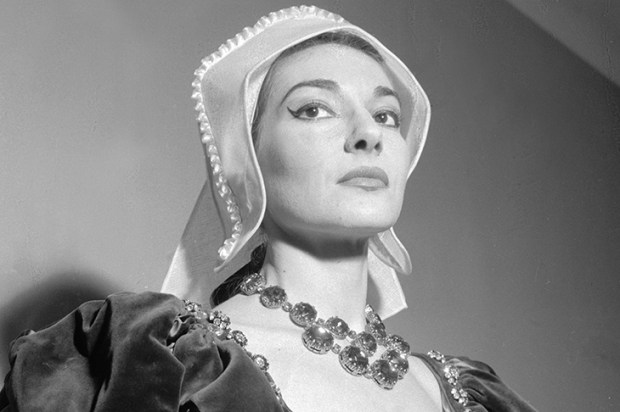I did not mean to snort so loudly. There I was watching the amazing Simon Russell Beale in King Lear at the National Theatre and things were all getting a bit nasty — what with daughters scheming and people having their eyes gouged out. And then, through a small earpiece, which no one else could hear, I heard the immortal words, said in a deep and quiet voice: ‘Lear enters to find Goneril clenched in tight embrace with Edgar. He clasps her tightly.’ At my snort, a very serious man behind me tapped me on the shoulder and ‘shushed’ me. He had no idea that I was tuned into the wonderful world of audio description, or AD as the industry refers to it.
For the uninitiated, AD has been around for some time. Essentially, it is vocal explanation of what is happening on stage or on screen, and gives visually impaired and blind people the most important visual clues that carry the story or plot. Like subtitles for deaf and hard of hearing people, it is increasingly being preprogrammed on DVDs and broadcast through headphones in the cinema, and is currently available on most terrestrial channels. Essentially, it conveys the most important visual aspects of the story by providing commentary during natural pauses and convenient moments of quiet.
According to BBC archives, the first film to be audio-described was Indiana Jones and the Temple of Doom. Sadly, I missed out on this, but was first introduced to AD watching the 007 series, starting with Dr No about five years ago. All I can say is, before you tune in, hang on to your sofa, ladies and gentlemen. The descriptions of Honey Rider (Ursula Andress) coming out of the sea in her bikini are genius. Out of my speaker came the following: ‘A woman is swimming in the sea. She is wearing a two-piece white bikini. The water glistens on her body, and the sea sparkles behind her. She throws two shells on to the beach. Bond looks at her and smiles. His jaw tightens. He raises his eyebrows.’ I am not sure how graphic Bond movies are these days, but this is hot stuff.
AD is useful in many ways. It can, for example, amplify details in action films that are often impossible to follow if you can’t see. At a recent viewing of The Hunger Games: Catching Fire, which I attended with my excited godson, it was very useful to know that when the evil nasty President (we learnt he was evil because he wants all the kiddies to die) sipped his champagne, a bit of blood slipped back into his glass, thus informing the audience he was ‘not well’. And when people were punching, stabbing and shooting themselves silly, at least I knew who was actually dead (e.g., ‘a small girl with curly hair falls back with a knife in her chest’). All important stuff if you can face this sort of film.
But, as ever with these wonderful ‘accessible’ inventions, there are issues. First of all, not all theatres can afford the technology required to broadcast AD and not all cinemas are equipped with it. It’s also not clear whether one’s sighted family want to sit around on a Sunday evening watching Morse with a constant commentary. Perhaps someone can invent something more private. And while descriptions are supposedly objective, there is a danger you might be in the hands of the describer and their agenda for the day.
My trip to the Olympics in 2012 is a prime example. My fiancé, an avid sports fan, had miraculously found tickets to the finals of the athletics. Even though I pleaded that I could not see (I have about 15 per cent vision), Fiancé had thought ahead. ‘Ha ha! There is audio description!’ We arrived at the stadium, me with my white cane in hand, where I was given a tiny earpiece (complete with regulation safety plastic shield). We trundled to our seats and cheered as the specs of javelin throwers walked into the arena. A high-pitched male voice leaned into my brain. ‘And now the Russians have entered the stadium.’ But instead of sports commentary, I got fashion updates. The Russians were wearing, for example, ‘fabulous’ red-and-white midriff singlets, with matching stretch pants and hoodies. Suddenly, I heard a huge roar from the crowd, but had no idea what had just happened. There was a pause, and then ten seconds too late the voice added, ‘And that’s gold for Russia!’
For me, too, there is the issue as to whether the experience is more of an interpretation of the story — almost adding another layer to what a director or an actor intended. At a recent performance of Versailles at the Donmar Warehouse, I found myself wondering who made the decisions to describe or not. The young soldier marches in ‘sternly’; the mother looks ‘forlorn’. After the show, when I met the delightful describer Jo, whose soothing tones accompanied me throughout the matinée, she told me that such decisions are really in the hands of the person describing, and so she and her colleagues go through the play very carefully before each performance to elucidate and map it out for listeners. She says, however, they are very vigilant in not overstepping the director’s intention. I worry that not all describers are this conscientious.
Yet while these are concerns, my general feeling is that AD is better than nothing. It gives me enough knowledge to link information together that is visual and prevents me from jabbing friends in the ribs and whispering ‘who’s dead?’ during a show. And in the end, doesn’t all art involve some degree of interpretation? Our understanding of the world around us has always involved the decoding and translation of visual elements into words and words into the visual, whether we are blind or not. Not every word will fit every action, but we can try. It just takes a bit of imagination. Now if you don’t mind, I must get back to Bond.
Got something to add? Join the discussion and comment below.
Get 10 issues for just $10
Subscribe to The Spectator Australia today for the next 10 magazine issues, plus full online access, for just $10.














Comments
Don't miss out
Join the conversation with other Spectator Australia readers. Subscribe to leave a comment.
SUBSCRIBEAlready a subscriber? Log in